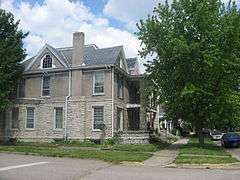East Wabash Historic District
|
East Wabash Historic District | |
|
East Wabash Historic District, May 2012 | |
  | |
| Location | Roughly bounded by Walnut, E. Market, N. Wabash, and S. East Sts., Wabash, Indiana |
|---|---|
| Coordinates | 40°47′56″N 85°49′04″W / 40.79889°N 85.81778°WCoordinates: 40°47′56″N 85°49′04″W / 40.79889°N 85.81778°W |
| Area | 185 acres (75 ha) |
| Architectural style | Federal, Italianate, Second Empire, Queen Anne, Colonial Revival, Bungalow/Craftsman |
| NRHP Reference # | 11000390[1] |
| Added to NRHP | June 23, 2011 |
East Wabash Historic District is a national historic district located at Wabash, Wabash County, Indiana. It encompasses 204 contributing buildings in a predominantly residential section of Wabash. It developed between about 1850 and 1930, and includes representative examples of Federal, Italianate, Second Empire, Queen Anne, Colonial Revival, and Bungalow / American Craftsman style architecture. Notable buildings include the George and Sophie Lumaree House (c. 1880), Treaty Stone and Lime Company (1887), Grandstaff Hentgen Funeral Service, James D. Conner House (c. 1860), Cowgill House (c. 1880), Kaiser Hotel (c. 1887), C.W. Cowgill House (1850), and St. Matthew's Evangelical and Reformed Church (1862, 1879).[2]
It was listed on the National Register of Historic Places in 2011.[1]
References
- 1 2 "National Register of Historic Places Listings". Weekly List of Actions Taken on Properties: 6/20/11 through 6/24/11. National Park Service. 2011-07-01.
- ↑ "Indiana State Historic Architectural and Archaeological Research Database (SHAARD)" (Searchable database). Department of Natural Resources, Division of Historic Preservation and Archaeology. Retrieved 2016-07-01. Note: This includes Michael Galbraith; et al. (November 2010). "National Register of Historic Places Inventory Nomination Form: East Wabash Historic District" (PDF). Retrieved 2016-07-01. and Accompanying photographs


